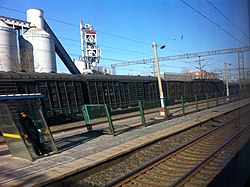Liulihe
Liulihe Area 琉璃河地区 | |
|---|---|
 Liulihe Station of the Beijing–Guangzhou railway, 2014 | |
| Coordinates: 39°36′40″N 116°01′45″E / 39.61111°N 116.02917°E | |
| Country | China |
| Municipality | Beijing |
| District | Fangshan |
| Village-level Divisions | 5 communities 47 villages |
| Area | |
• Total | 107 km2 (41 sq mi) |
| Population (2020) | |
• Total | 66,787 |
| • Density | 620/km2 (1,600/sq mi) |
| Time zone | UTC+8 (China Standard) |
| Postal code | 102403 |
| Area code | 010 |
Liulihe Area (Chinese: 琉璃河地区; pinyin: Liúlíhé Dìqū) is a town and an area within Fangshan District, Beijing. It borders Shilou, Doudian and Changyang Towns in its north, Beizangcun and Pangezhuang Towns in its east, Zhuolu City in its south, and Hangcunhe Town in its west. In the year 2020, its total population was 66,787.[1]
The name Liulihe (Chinese: 琉璃河; lit. 'Lapis Lazuli River') comes from the Liuli River that passes through the town.[2]
History
| Time | Status |
|---|---|
| Ming dynasty | Known as Yanguli |
| Qing dynasty | Known as Liulihe Town |
| 1916 | Part of Liangxiang County |
| 1928 | Under the 3rd District of Liangxiang County |
| 1949 | Part of the 7th District of Liangxiang County |
| 1951 | Part of the 3rd District of Liangxiang County |
| 1958 | Part of Liulehe People's Commune, under Zhoukoudian District |
| 1960 | Transferred to Fangshang County |
| 1980 | Restored as Liulihe Town |
| 1983 | Reorganized into a township |
| 1989 | Reorganized into an area |
| 2000 | Became a town while retaining the status of area |
| 2002 | Incorporated Dongnanzhao Town and Yaoshang Township |
Administrative divisions
In 2021, Liulihe Area oversaw 52 subdivisions, which can be further classified into 5 communities and 47 villages:[3]
| Administrative Division Code | Subdisvision Names | Name Transliteration | Type |
|---|---|---|---|
| 110111010001 | 二街 | Erjie | Community |
| 110111010002 | 窗纱厂 | Chuanshachang | Community |
| 110111010003 | 琉璃河水泥厂 | Liulihe Shuinichang | Community |
| 110111010004 | 建材工业学校 | Jiancai Gongye Xuexiao | Community |
| 110111010005 | 金果林 | Jinguolin | Community |
| 110111010200 | 二街 | Erjie | Village |
| 110111010201 | 三街 | Sanjie | Village |
| 110111010202 | 李庄 | Lizhuang | Village |
| 110111010203 | 白庄 | Baizhuang | Village |
| 110111010204 | 杨户屯 | Yanghutun | Village |
| 110111010205 | 周庄 | Zhouzhuang | Village |
| 110111010206 | 福兴 | Fuxing | Village |
| 110111010207 | 平各庄 | Pinggezhuang | Village |
| 110111010208 | 北洛 | Beiluo | Village |
| 110111010209 | 南洛 | Nanluo | Village |
| 110111010210 | 古庄 | Guzhuang | Village |
| 110111010211 | 祖村 | Zucun | Village |
| 110111010212 | 北章 | Beizhang | Village |
| 110111010213 | 兴礼 | Xingli | Village |
| 110111010214 | 庄头 | Zhuangtou | Village |
| 110111010215 | 立教 | Lijiao | Village |
| 110111010216 | 董家林 | Dongjialin | Village |
| 110111010217 | 刘李店 | Liulidian | Village |
| 110111010218 | 洄城 | Huicheng | Village |
| 110111010219 | 黄土坡 | Nantupo | Village |
| 110111010220 | 东南召 | Dongnanzhao | Village |
| 110111010221 | 西南召 | Xinanzhao | Village |
| 110111010222 | 东南吕 | Dongnanlü | Village |
| 110111010223 | 西南吕 | Xinanlü | Village |
| 110111010224 | 保兴庄 | Baoxingzhuang | Village |
| 110111010225 | 路村 | Lucun | Village |
| 110111010226 | 南白 | Nanbai | Village |
| 110111010227 | 北白 | Beibai | Village |
| 110111010228 | 八间房 | Bajiandian | Village |
| 110111010229 | 薛庄 | Xuezhuang | Village |
| 110111010230 | 石村 | Shicun | Village |
| 110111010231 | 常舍 | Changshe | Village |
| 110111010232 | 西地 | Xidi | Village |
| 110111010233 | 务滋 | Wuzi | Village |
| 110111010234 | 赵营 | Zhaoying | Village |
| 110111010235 | 任营 | Renying | Village |
| 110111010236 | 万里 | Wanli | Village |
| 110111010237 | 肖场 | Xiaochang | Village |
| 110111010238 | 窑上 | Yaoshang | Village |
| 110111010239 | 大陶 | Datao | Village |
| 110111010240 | 小陶 | Xiaotao | Village |
| 110111010241 | 官庄 | Guanzhuang | Village |
| 110111010242 | 贾河 | Jiahe | Village |
| 110111010243 | 鲍庄 | Baozhuang | Village |
| 110111010244 | 辛庄 | Xinzhuang | Village |
| 110111010245 | 五间房 | Wujianfang | Village |
| 110111010246 | 韩营 | Hangying | Village |
Landmark
See also
References
- ^ "北京市房山区第七次全国人口普查公报". Beijing Fangshan Bureau Of Statistics. Retrieved 2022-10-09.
- ^ a b 李立国; 李万钧; 吴世民, eds. (2013). 中华人民共和国政区大典, 北京市卷. Beijing: 中国社会出版社. ISBN 978-7-5087-4058-4. OCLC 910451741.
- ^ "2021年统计用区划代码和城乡划分代码". www.stats.gov.cn. Retrieved 2022-10-09.


